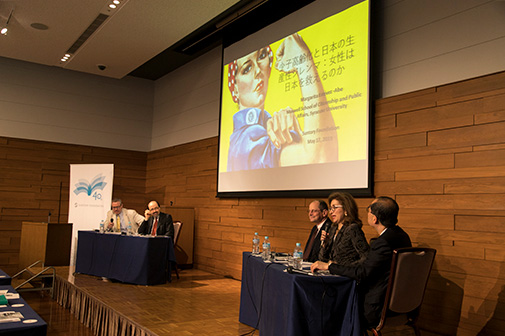Forum Report
Japan is one of the most rapidly aging country in the world. It has one of the highest life expectancies in the world, and simultaneously the nation’s birth rate has remained low since the late twentieth century. As a result, proportion of the people at the senior age within the entire population has been steadily increasing throughout the past few decades. Many people fear that it would become difficult to sustain a society if this trend continues, as the people in the senior age are often regarded as being less productive than the younger generations. One of the most frequently raised issues in Japan nowadays is therefore on how to deal with challenges which are expected from this rapidly aging society.
For the 15th forum of “Reexamining Japan in Global Context”, held on May 17, 2019 at the International House of Japan, four speakers were invited to discuss how to promote ‘happiness’ in Japanese society amid acute population aging. After the keynote speech by Mr. Bill Emmott, a journalist and former editor-in-chief of The Economist, three other speakers elaborated on the key issues which he raised. Mr. Jonathan Rauch, a journalist and contributing editor of The Atlantic Monthly, picked up on how to tackle the issue that larger number of people in senior generation are suffering from the sense of isolation, and argued that their social participation should be encouraged. Dr. Margarita Estévez-Abe, an Associate Professor of Maxwell School of Citizenship and Political Affairs, University of Syracuse, discussed primarily on the importance of eradicating gender inequality to promote ‘happiness’ in Japanese society. Professor Hiroshi Yoshikawa, the President of Rissho University and Professor Emeritus of the University of Tokyo, offered his insight on how to deal with the economic difficulties that the Japanese society is currently facing.
This international symposium was held also as one of the events to commemorate 40th anniversary of the Suntory Foundation.
Aging Society as an Opportunity




